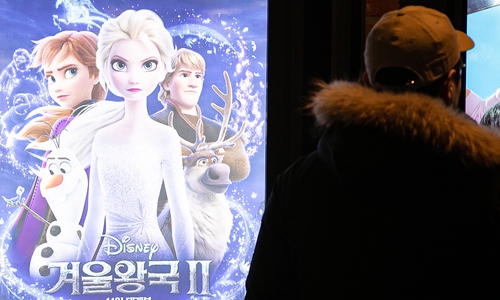Chinese netizens concerned over S.Korea’s decision to reopen cinemas
By Chen Xi and Xu Liuliu Source:Global Times Published: 2020/4/27 22:08:40

A moviegoer stands in front of a poster for Frozen 2 in a cinema in South Korea on Sunday. Photo: VCG
Chinese netizens expressed concern over the safety of moviegoers in South Korea after CGV, South Korea's largest multiplex chain, announced that it will reopen 36 theaters on Wednesday.
South Korean news agency Yonhap News Agency reported on Friday that the company made the decision to save the "virus-hit film industry and our neighborhood economy."
"South Korean theaters have chosen to resume business on April 29 for the need of market and their 'golden holiday' from April 30 to May 5 including Seokga tansinil, also called Buddha's Birthday, Labor Day and Children's Day," Shi Wenxue, a film critic living in Beijing, told the Global Times on Monday.
Social distancing measures, including selling a limited number of tickets, will be implemented at all reopened theaters, according to reports.
However, some Chinese netizens were concerned that the reopened theaters might increase the risk of spreading the novel coronavirus.
"China took earlier measures than South Korea in controlling the spread of the coronavirus, and do not dare to reopen theaters, while South Korea has now decided to reopen theaters. I think they should think twice. If I was a South Korean, I would not choose to go to a public place," one Chinese netizen commented on Sina Weibo.
Films made in South Korean and abroad that were postponed due to the outbreak of the COVID-19 pandemic have been rescheduled to be screened in the near future, according to the report, which stirred discussion whether China can also reopen theaters in the Chinese mainland.
"The entertainment industry, the film industry in particular, is very important to South Korea. But in China, movies are ranked at the bottom of the industry chain. Even now parks and restaurants are open, but movie theaters are not allowed to be opened," one Chinese netizen wrote on Sina Weibo.
According to Shi, the Chinese mainland is currently unable to emulate South Korea's cinema resumption as the film industry chain is not mature enough as well as due to different approaches to epidemic prevention and control.
Due to the movie watching habits of South Korean moviegoers, South Korean movies are not highly dependent on film schedules, while movies in Chinese theaters are highly dependent on schedules surrounding major holidays such as Chinese New Year, the May Labor Day, the October National Day and summer vacation.
"The concentration of the release time in those schedules will cause a dense population among moviegoers," he said.
Boasting nearly 70,000 screens, the Chinese cinema industry has been one of the hardest hit industries since the epidemic forced the closure of theaters at the end of January, right before the huge Chinese New Year holiday period.
With no revenue, cinemas have had to survive by cutting expenses, first by laying off staff. South Korean cinema chain CJ CGV has recently laid off as much as 30 percent of its workforce in China, according to China's media Security Daily. The chain has 141 cinemas across China and ranks fourth in terms of box-office income. However, a source from CJ China's senior management on Monday denied the report in an exclusive interview with the Global Times, saying that CGV China has not laid off staff and does not currently have plans to do so for now.
From film studios to cinema giants like CGV, theater chains are all trying to survive one of the darkest periods for the industry. Estimates put the losses for the world's second largest film market to be half of its annual income, roughly $4 billion.